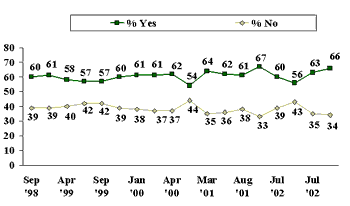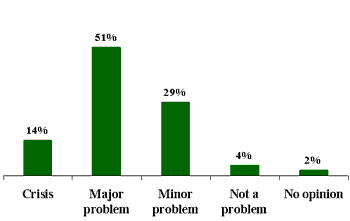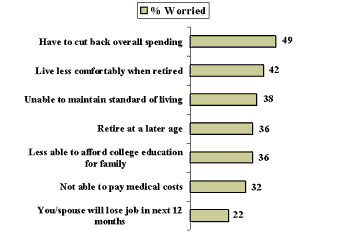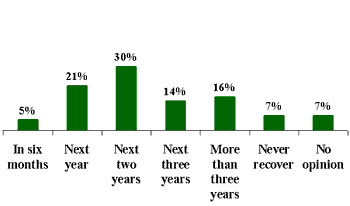GALLUP NEWS SERVICE
Nearly two out of three Americans (62%) say they are following the news about the stock market very or somewhat closely, according to latest CNN/USA Today/Gallup poll, conducted July 29-31. Of course, two out of three Americans also say they own stock, and an even higher percentage -- three out of four -- of these Americans say they are paying attention to the wild gyrations of today's market.
| Do you have money invested in the stock market right now? |
 |
Perceptions of the Market Are Negative
Although the latest poll was taken following a huge four-day advance of the Dow and the third-biggest one-day gain ever, it is not surprising that the long-term decline of the stock market has left many Americans with very negative feelings:
- Two out of three Americans (68%) feel that buying stocks is more of a gamble as opposed to a sound investment (29%). Significantly, 63% of today's stockowners feel the same way.
- Three out of four Americans (78%) feel that the stock market favors the rich. Also of significance, 76% of today's stockowners agree.
One reason for these negative feelings is clearly related to the losses stockowners have been suffering. In fact, six out of 10 stockowners (59%) say they have lost money in stocks or mutual funds over the past year. And, while nearly two out of three stockowners (63%) say they think a "buy and hold" strategy is best for them, one out of five stockowners say they have taken money out of the market during the past year.
Further, just more than one-third of the public (37%) says that if it had $1,000 to spend, investing it in the stock market would be a good idea. Obviously, a sizable number of stockowners are acting on their negative perceptions of the stock market in the "free market" manner: by reducing -- not increasing -- their stock market investments.
Market Decline Is a Major Problem
More important than the public's negative feelings about the stock market is the public's perception of what the market's decline means for the country. Two out of three Americans say they feel the stock market's decline is a major problem (51%) or crisis (14%) for this country. Further, a stunning one out of three Americans (34%) tell Gallup that the market's decline has shaken their confidence in the American economy. Clearly, such a finding suggests that the course of the stock market is having a major impact on consumer confidence in the United States.
| Significance of the Stock Market Decline |
 |
| July 29-31, 2002 |
Market Decline Has People Worried
One out of three Americans (35%) say the stock market directly affects them because they have money invested. Another 43% say they are indirectly impacted by the stock market because of the way it affects the economy. Only one out of five Americans (21%) say the stock market does not affect them at all.
The impact of the market's decline is clearly shown by the things people say they are worried about. As July ended, about half of Americans said they are worried that they may have to cut back on their overall spending. Given the recent reports showing the economy weaker than expected during the second quarter, this is clearly not encouraging for the nation's retailers.
Four out of 10 people (42%) say they are worried that the market's decline could mean that they will live less comfortably in retirement. Three out of 10 (36%) say they fear the market's decline could make them retire later than they had hoped. And, the same percentage (36%) say they are worried that they might be less able to afford a college education for their family as a result of the market's decline. Clearly, the market's woes have the potential to have long-term as well as short-term effects on the American consumer.
| Amount of Concern for the Future |
 |
| July 29-31, 2002 |
Recovery Will Take Time
Not surprisingly, nearly six out of 10 people (58%) say they think the stock market will be somewhat or much higher a year from now. Americans are always optimistic about the future. If this long-term optimism ever begins to fade, then the ability of the economy to recover would be much more severely threatened.
But most of the public is also very realistic -- not expecting the economy, nor the Dow, to recover overnight. In fact, only one out of four Americans (26%) say they expect the Dow to hit 11,000 in the next year -- the same percentage who expect the economy to fully recover within that time frame. Instead, more than half (57%) expect the economy to fully recover within two years, and virtually the same percentage (56%) expect the Dow to reach 11,000 within that same period.
| When will Dow Jones recover to 11,000 level? |
 |
| July 29-31, 2002 |
Survey Methods
These results are based on telephone interviews with 1,003 national adults, aged 18+, conducted July 29-31, 2002. For results based on the total sample of national adults, one can say with 95% confidence that the maximum margin of sampling error is ±3 percentage points. For results based on the sample of -- 720 -- stockowners, the maximum margin of sampling error is ±4 percentage points.
Please tell me whether you are worried or not worried about each of the following happening. How about that -- [RANDOM ORDER]?
A. You or your spouse will lose a job within the next twelve months
|
Worried |
Not worried |
No opinion |
||
|
% |
% |
% |
||
|
2002 Jul 29-31 |
22 |
73 |
5 |
|
|
2002 Jul 26-28 ^ |
27 |
70 |
3 |
|
|
2001 Oct 5-6 ^ |
29 |
70 |
1 |
|
|
1992 Oct 23-25 ^ |
29 |
67 |
4 |
|
|
1992 Jan 3-6 ^ |
36 |
62 |
2 |
|
|
1991 Nov ^ |
31 |
65 |
4 |
|
|
^ |
WORDING: Please tell me whether you are worried or not worried about each of the following happening in the next 12 months. How about (that you or your spouse will lose a job)? |
|||
B. You will not be able to maintain your standard of living
|
Worried |
Not worried |
No opinion |
||
|
% |
% |
% |
||
|
2002 Jul 29-31 |
38 |
61 |
1 |
|
|
2002 Jul 26-28 ^ |
40 |
59 |
1 |
|
|
2001 Oct 5-6 ^ |
36 |
64 |
* |
|
|
1992 Oct 23-25 ^ |
46 |
54 |
* |
|
|
1992 Jan 3-6 ^ |
48 |
52 |
* |
|
|
1991 Nov ^ |
44 |
56 |
* |
|
|
^ |
WORDING: Please tell me whether you are worried or not worried about each of the following happening in the next 12 months. How about (that you will not be able to maintain your standard of living)? |
|||
C. You will not be able to pay medical or health costs over the next twelve months
|
Worried |
Not worried |
No opinion |
||
|
% |
% |
% |
||
|
2002 Jul 29-31 |
32 |
68 |
* |
|
|
2001 Oct 5-6 ^ |
36 |
64 |
* |
|
|
1992 Oct 23-25 ^ |
46 |
54 |
* |
|
|
1992 Jan 3-6 ^ |
48 |
52 |
* |
|
|
1991 Nov ^ |
45 |
54 |
1 |
|
|
^ |
WORDING: Please tell me whether you are worried or not worried about each of the following happening in the next 12 months. How about (that you will not be able to pay medical or health costs)? |
|||
D. You will live less comfortably when you retire as a result of the recent decline in the stock market
|
Worried |
Not worried |
No opinion |
|
|
2002 Jul 29-31 |
42% |
54 |
4 |
E. You will retire at a later age than you previously thought as a result of the recent decline in the stock market
|
Worried |
Not worried |
No opinion |
|
|
2002 Jul 29-31 |
36% |
58 |
6 |
F. You will have to cut back on your overall spending
|
Worried |
Not worried |
No opinion |
|
|
2002 Jul 29-31 |
49% |
51 |
* |
G. You will be less able to afford college education for your family as a result of the recent decline in the stock market
|
Worried |
Not worried |
No opinion |
|
|
2002 Jul 29-31 |
36% |
58 |
6 |
|
* Less than 0.5% |
|||
SUMMARY TABLE: AMOUNT OF CONCERN FOR THE FUTURE
|
2002 Jul 29-31 |
|
Not worried |
|
|
% |
% |
||
|
Have to cut back on your overall spending |
49 |
51 |
|
|
Live less comfortably when you retire as a result of recent decline in stock market |
42 |
54 |
|
|
Not be able to maintain your standard of living |
38 |
61 |
|
|
Retire at a later age than previously thought as a result of recent decline in stock market |
36 |
58 |
|
|
Less able to afford college education for family as result of recent decline in stock market |
36 |
58 |
|
|
Not be able to pay medical or health costs over the next twelve months |
32 |
68 |
|
|
Will lose a job within the next twelve months |
22 |
73 |
|
If you had a thousand dollars to spend, do you think investing it in the stock market would be a good or bad idea?
|
Good idea |
Bad idea |
DEPENDS (vol.) |
No opinion |
|
|
% |
% |
% |
% |
|
|
2002 Jul 29-31 |
37 |
58 |
3 |
2 |
|
2002 Jul 22-24 |
31 |
63 |
3 |
3 |
|
2002 Jun 21-23 |
45 |
51 |
2 |
2 |
|
2002 Apr 8-11 |
47 |
48 |
3 |
2 |
|
2001 Apr 6-8 |
42 |
53 |
2 |
3 |
|
2001 Jan 10-14 |
42 |
53 |
3 |
2 |
|
2000 Dec 2-4 |
46 |
49 |
2 |
3 |
|
2000 Oct 13-14 |
57 |
36 |
2 |
5 |
|
2000 Jan 7-10 |
67 |
28 |
2 |
3 |
|
1999 Oct 21-24 |
51 |
44 |
2 |
3 |
|
1999 Sep 10-14 |
60 |
33 |
3 |
4 |
|
1999 June 4-5 |
60 |
34 |
3 |
3 |
|
1999 Mar 12-14 |
59 |
35 |
3 |
3 |
|
1998 Sep 1 |
46 |
48 |
3 |
3 |
|
1998 Apr 17-19 |
65 |
28 |
4 |
3 |
|
1997 Oct 30 |
46 |
47 |
3 |
4 |
|
1997 Oct 27 |
53 |
43 |
1 |
9 |
|
1997 Jul 25-27 |
62 |
33 |
1 |
4 |
|
1994 Mar 9-10 |
38 |
46 |
9 |
7 |
|
1990 Feb |
26 |
68 |
2 |
4 |
|
(vol.) Volunteered response |
||||
Thinking ahead to a year from now, do you think the stock market will be [ROTATED: much higher, somewhat higher, about the same, somewhat lower, (or) much lower]than it is today?
|
Much |
Somewhat higher |
About the same |
Somewhat lower |
Much |
No |
|||
|
% |
% |
% |
% |
% |
% |
|||
|
2002 Jul 29-31 |
11 |
47 |
28 |
7 |
3 |
4 |
||
|
2002 Jul 26-28 |
7 |
45 |
26 |
13 |
4 |
5 |
||
|
2002 Jun 28-30 |
5 |
29 |
38 |
19 |
6 |
3 |
||
|
2001 Apr 6-8 |
10 |
44 |
29 |
9 |
4 |
4 |
||
|
2001 Jan 10-14 |
5 |
29 |
34 |
19 |
6 |
7 |
||
Which of these statements do you think best describes the recent decline in the stock market for the country as a whole -- [ROTATED: it is a crisis, it is a major problem for the country but is not a crisis, it is a minor problem for the country, (or) it is not a problem for the country at all]?
|
|
Major problem |
Minor problem |
Not a |
No |
|
|
2002 Jul 29-31 |
14% |
51 |
29 |
4 |
2 |
|
2002 Jul 22-24 |
18% |
50 |
25 |
3 |
4 |
Did the fall of the stock market in recent weeks shake your confidence in the American economy, or didn't it change your opinion?
|
Yes, |
No, didn't |
No |
||
|
% |
% |
% |
||
|
National Adults |
||||
|
2002 Jul 29-31 |
34 |
65 |
1 |
|
|
1997 Oct 29-30 ^ |
14 |
77 |
9 |
|
|
1987 Oct 22 ^ |
26 |
68 |
6 |
|
|
Stockowners |
||||
|
2002 Jul 29-31 |
34 |
65 |
1 |
|
|
^ |
Time/CNN/Yankelovich Clancy Schulman Poll |
|||
Which comes closest to your view of the stock market -- [ROTATED: it directly affects you because you have money invested in the stock market, it indirectly affects you because of the way the stock market affects the economy, or it does not affect you at all]?
|
Directly |
Indirectly |
Does not |
No |
|
|
National Adults |
||||
|
2002 Jul 29-31 |
35% |
43 |
21 |
1 |
|
Stockowners |
||||
|
2002 Jul 29-31 |
51% |
38 |
11 |
* |
|
* Less than 0.5% |
||||
When do you think the economy will fully recover -- within the next six months, within the next year, within the next two years, within the next three years, more than three years, or do you think it will never recover?
|
|
|
|
|
More than three years |
|
|
|
|
2002 Jul 29-31 |
6% |
20 |
31 |
18 |
16 |
6 |
3 |
The last time the Dow Jones Industrial Average hit the 11,000 mark was in June of 2001. About how long do you think it will be before the Dow Jones Industrial Average reaches that level again -- within the next six months, within the next year, within the next two years, within the next three years, more than three years, or do you think it will never recover?
|
|
|
|
|
More than three years |
|
|
|
|
National Adults |
|||||||
|
2002 Jul 29-31 |
5% |
21 |
30 |
14 |
16 |
7 |
7 |
|
Stockowners |
|||||||
|
2002 Jul 29-31 |
4% |
22 |
33 |
15 |
19 |
3 |
4 |
Generally speaking, do you think buying stocks is -- [ROTATED: more of a gamble, (or) more of a sound investment]?
|
More of a |
More of a |
No |
|
|
National Adults |
|||
|
2002 Jul 29-31 |
68% |
29 |
3 |
|
Stockowners |
|||
|
2002 Jul 29-31 |
63% |
35 |
2 |
Do you think the stock market does -- or does not -- favor the rich?
|
Favors the rich |
Does not favor the rich |
No opinion |
|
|
National Adults |
|||
|
2002 Jul 29-31 |
78% |
19 |
3 |
|
Stockowners |
|||
|
2002 Jul 29-31 |
76% |
23 |
1 |
How closely do you follow news about the stock market -- very closely, somewhat closely, not too closely, or not at all?
|
Very |
Somewhat closely |
Not too closely |
|
No |
|
|
National Adults |
|||||
|
2002 Jul 29-31 |
17% |
45 |
24 |
13 |
1 |
|
Stockowners |
|||||
|
2002 Jul 29-31 |
21% |
54 |
20 |
5 |
* |
|
* Less than 0.5% |
|||||
Do you personally or jointly with a spouse, have any money invested in the stock market right now – either in an individual stock, a stock mutual fund, or in a self-directed 401-K or IRA?
|
Yes |
No |
No opinion |
|
|
% |
% |
% |
|
|
2002 Jul 29-31 |
66 |
34 |
* |
|
2002 Jul 26-28 |
63 |
35 |
2 |
|
2002 Jul 22-24 |
56 |
43 |
1 |
|
2002 Jul 5-8 |
60 |
39 |
1 |
|
2002 Jun 28-30 |
67 |
33 |
* |
|
2001 Aug 3-5 |
61 |
38 |
1 |
|
2001 Apr 6-8 |
62 |
36 |
2 |
|
2001 Mar 14 ^ |
64 |
35 |
1 |
|
2000 May 5-7 |
54 |
44 |
2 |
|
2000 Apr 7-9 |
62 |
37 |
1 |
|
2000 Mar 10-12 |
61 |
37 |
2 |
|
2000 Jan 7-10 |
61 |
38 |
1 |
|
1999 Oct 21-24 |
60 |
39 |
1 |
|
1999 Sep 10-14 |
57 |
42 |
1 |
|
1999 Jun 4-5 |
57 |
42 |
1 |
|
1999 Apr 30-May 2 |
58 |
40 |
2 |
|
1999 Mar 12-14 |
61 |
39 |
* |
|
1998 Sep 1 |
60 |
39 |
1 |
|
^ Based on one-night poll. |
|||
|
* Less than 0.5% |
In the past year, would you say the stocks or mutual funds you have invested in have -- [ROTATED: made money, remained about even, or have they lost money]?
BASED ON -- 720 -- STOCKOWNERS
|
Made money |
Remained even |
Lost money |
No opinion |
|
|
2002 Jul 29-31 |
15% |
24 |
59 |
2 |
In the past year, have you taken any money out of the stock market, or not?
BASED ON -- 720 -- STOCKOWNERS
|
Yes |
No |
No opinion |
|
|
2002 Jul 29-31 |
20% |
79 |
1 |
Many financial advisors recommend an investment strategy called "buy and hold" in which investors buy stocks and hold them for the long-term. Do you think this is the best strategy for you, or is another strategy better?
BASED ON -- 720 -- STOCKOWNERS
|
Buy and hold |
Another strategy |
No opinion |
|
|
2002 Jul 29-31 |
63% |
30 |
7 |

